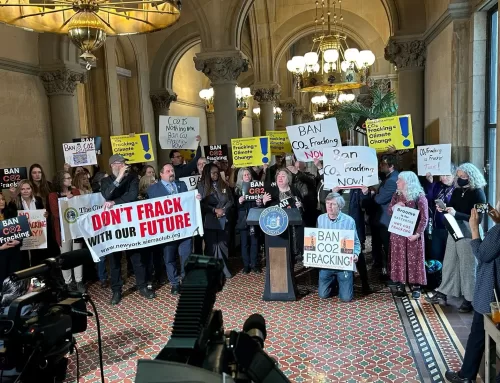Nuclear Facility Not Designed for Long-Term Storage of Highly Radioactive Material
Hudson River Sloop Clearwater, the environmental organization that has led the grassroots effort in protecting and preserving the Hudson River over the past four decades, filed new contentions with the Atomic Safety and Licensing Board that raise important environmental and safety concerns regarding the storage of nuclear waste on site at the Indian Point Nuclear Energy Plant in Buchanan, NY.
These contentions, which are directed to the Indian Point re-licensing case, state that:
1) even though Indian Point was never supposed to be storing spent fuel waste on site for longer than 5 years, the minimum time required for cooling before the spent fuel can be removed from the pool, it has become a de facto permanent nuclear waste storage site because, although the federal government has spent half a century trying, it has failed to come up with a way to dispose of this highly radioactive waste;
2) the Nuclear Regulatory Commission (“NRC”) allows the spent fuel waste to be densely stored in wet pools at concentrations greater than the pools were designed to hold, and which are more vulnerable than the reactor itself and environmentally dangerous; and
3) unless the NRC and Entergy Nuclear Operations, Inc. (“Entergy”) can demonstrate that storing even more spent fuel waste on site will be both safe and environmentally benign, the license to generate yet more spent fuel waste cannot be legally renewed. Presently, the existing spent fuel pool at Indian Point’s Unit 2 nuclear reactor has proven to be leaking, and, according to Dr. Gordon Thompson, a research professor at Clark University and an expert on nuclear waste, spent fuel pools are both unsafe and especially vulnerable to terrorist attacks.
“An adequate analysis of the environmental, health and safety impacts of spent fuel storage at Indian Point has to be performed,” said Jeff Rumpf, executive director of Clearwater. “People living in the area have a right to know what dangers they may face with all of this radioactive material on site.”
When Indian Point’s reactors were initially licensed, the nuclear power industry intended to either reprocess the waste or store the waste off-site. As such, Indian Point was not designed for long-term storage of the waste. Since 1983, the Department of Energy (“DOE”), who under law was to begin accepting waste from Indian Point in 1998, has been working to develop a permanent geological repository. In 1987, Congress selected Yucca Mountain in Nevada for this site, and the DOE began work on a long-term waste repository at this location. Yucca Mountain, however, has not accepted commercial nuclear waste from any of the nation’s more than 100 nuclear reactors to date. Many believe, in fact, that Yucca Mountain site is unsuitable and will never open.
Earlier this year President Obama and Senate Majority Leader Harry Reid had made it clear that the project to develop a permanent geological repository for the commercial nuclear power industry’s waste at Yucca Mountain would no longer receive funding. In September, two of the three active NRC commissioners issued votes on a waste storage rule indicating that they have no confidence that Yucca Mountain will open in the near future. In a nutshell, the NRC does not currently have confidence that a central waste repository for spent fuel will be available within 50-60 years, but Indian Point is requesting a twenty-year license extension, and during this time a large amount of spent nuclear fuel will be generated. In addition, the DOE is now commencing a study to look for other solutions to remove nuclear waste that has been accumulating at nuclear power plants, but have set no dates for these solutions.
In the meantime, waste keeps accumulating at Indian Point and neither Entergy nor the NRC has assessed the safety or environmental impacts of the long-term storage of spent fuel. Currently, the waste is stored at Indian Point in overcrowded spent fuel pools and in above ground dry cask storage. The spent fuel pools have been holding waste for longer than anticipated and the pools are packed more densely than originally intended.
“The nuclear industry has spent over 50 years debating how to safely handle the radioactive waste generated by nuclear reactors,” said Ross Gould, Clearwater board member. “When the plants were first designed, the plan was to remove the spent fuel and take it off-site, but this has not happened. Instead, we are left with nuclear waste accumulating at Indian Point, turning Buchanan into a nuclear waste dump.”



